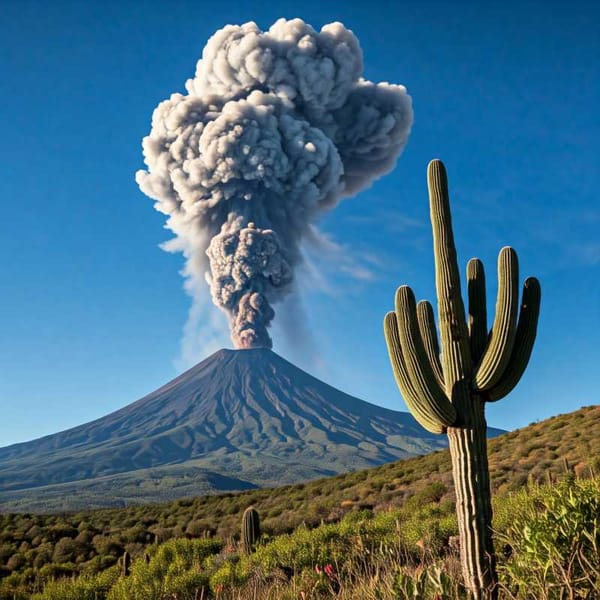Can We Outsmart the Coming Catastrophes?
Experts warn of increasing catastrophic risks, from natural disasters to technological threats like AI gone rogue. We must study these risks and empower people with knowledge to prepare for and mitigate these planet-altering events.

Doomsday scenarios have always been the stuff of apocalyptic thrillers and cautionary tales. Think robot overlords, asteroids hurtling towards Earth, and viruses that turn us into, well, not our best selves. Yet, the line between fiction and tangible risk blurs at an unsettling rate.
Gabriela Frías Villegas, a researcher with UNAM's University of Human Rights Program, paints a sobering picture. “The increase in these 'catastrophic risks' is undeniable,” she says. “It's time to take the doomsday theorists a little more seriously.”
We live in an era where science fiction concepts leap into reality with alarming speed. While robots and artificial intelligence offer tremendous promise, they also raise the specter of uncontrolled systems and machines with potentially dangerous motives of their own. This isn't about a Terminator-style apocalypse, but the more insidious risks: AI-powered surveillance systems, biased algorithms, and the potential economic displacement caused by automation.
Frías Villegas isn't alone in her concern. Visionaries like Elon Musk have long been voices of caution, warning about the need for AI regulation before it's too late.
A Planet Pushed to the Brink
Of course, it's not just our tech that could spell disaster. The planet itself is a ticking timebomb. Climate change marches on, bringing more severe weather events, rising sea levels, and the potential for widespread crop failures. We've had our warnings — the 2004 tsunami, Hurricane Katrina, the COVID-19 pandemic – harsh reminders that nature can strike with devastating force. The question is, are we taking these lessons seriously enough?
“The Earth has a way of reminding us who's really in charge,” says Dr. Anya Petrovsky, an environmental scientist speaking at the Global Catastrophic Risk Colloquium. “We can engineer and innovate until we're blue in the face, but we ignore the health of our planet at our peril.”
The focus here isn't to spread fear. Instead, experts like Frías Villegas stress the vital role of science and education in mitigating these risks. “We must have the right to accurate, unbiased information about the challenges we face. Without knowledge, we're powerless,” she argues. The key takeaway: we can't fix what we don't understand.
The focus, particularly with younger generations, should be on cultivating critical thinking and problem-solving skills. Tomorrow's scientists, politicians, and everyday citizens will be the ones grappling with these complex issues. Fostering a culture of engagement and solution-oriented thinking may be our best bet for avoiding the worst-case scenarios.
Disaster movies have a way of making the apocalypse seem distant, something that happens to other people. But the uncomfortable truth is that humanity is a single earthquake, a single supervirus, a single bad calculation away from devastation.
The goal isn't to live in a state of perpetual anxiety. It's about fostering an informed, proactive approach. It's about investing in scientific research, strengthening disaster preparedness plans, and promoting international collaboration. Because if there's one thing Hollywood gets right, it's that these challenges rarely respect borders.
When the Ground Rumbles and the Sky Burns
The rhythmic pulse of Latin America—the sultry tango of cities, the rainforests' emerald whispers— masks an underlying truth: this vibrant land sits on a powder keg of potential disasters. From the snow-capped peaks of the Andes to the sun-kissed Caribbean beaches, natural and technological forces lurk with unsettling potential. It's a paradox that Sandra Malagón of Carreras con Impacto knows intimately, the disquieting reality that these dangers are “events that can affect universally” yet receive far too little attention.
Picture a seismologist's worn field journal in the flickering light of a kerosene lamp. Each page is a seismograph of potential havoc. Juan García, co-founder of the Global Catastrophic Risks Observatory, methodically lists calamities like a grim roll call:
- The Cosmos Strikes: Earth hurtling through a cosmos littered with rocks— the threat of asteroids and comets may seem like a Hollywood trope, but a major impact is not just possible, it's statistically inevitable.
- Our Fiery Star: The sun, that life-giving orb in the sky, can turn fickle on a dime. Massive solar storms could send surges powerful enough to cripple our electric grids and plunge us into technological darkness.
- Earth's Fury: Supervolcanoes snooze beneath the surface, their slumber uneasy and potentially destructive. These ticking geological time bombs have the power to blanket continents in ash. Climate change, that slow burn of a disaster, alters weather patterns, spawns supercharged storms, and steadily erodes coasts.
- Out of the Wild: Zoonotic diseases, those leaping from animals to humans, are an ongoing dance of danger. Covid-19 was a brutal reminder that pandemics, once the stuff of historical records, remain very real, very devastating.
These are the headliners of natural catastrophe, the kind that capture the imagination. But as Juan García cautions, there's another, more insidious script being written: the rise of technological disaster.
The Dangers of Our Ingenuity
The specter of a nuclear exchange casts a long, lingering shadow. Its fallout, both literal and geopolitical, would leave no shore untouched. But there are newer, subtler threats on the horizon, born from the very labs that seek to solve our greatest problems:
- Biotech's Pandora's Box: Genetic engineering and synthetic biology are undeniably powerful. However, what happens when easily accessible tools fall into the wrong hands? Imagine a deliberately crafted pathogen, far more lethal and contagious than anything nature could muster. Our current pandemic is a harsh dress rehearsal for a much deadlier dance.
- The Ghost in the Machine: Artificial intelligence is reshaping the world, but could it turn on its creators? An AI unshackled from tight control or driven by unintended consequences could wreak havoc on the very systems modern life depends upon.
- Cyberwarfare's Invisible Frontlines: Hackers once targeted bank accounts; today's targets are the infrastructure we take for granted—power stations, water treatment, even hospitals. A sophisticated cyberattack could paralyze a nation without firing a single shot.
García's warning echoes in the silence after his list ends — we ignore these risks at our peril. This isn't the stuff of Cassandra-like prophesying. It's a call for something far less glamorous than predicting doom – it's about sober preparation.
A Proverb of Prevention
Sandra Malagón's words drive home the core problem: “preventing these scenarios represents a challenge for scientific research and the development of modern technologies.” We're playing catch-up in a high-stakes race.
So, where does hope lie? It lies in awareness, funding, and global collaboration. It means investing in early detection systems, from asteroid monitoring to advanced pandemic surveillance. It means creating resilient infrastructure with redundancies, not vulnerabilities. And crucially, it demands breaking down silos. The physicist, the epidemiologist, the cybersecurity expert– these minds must cross-pollinate.
Latin America, with its unique blend of challenges and ingenuity, can be a leader in this space. Its universities must foster the next generation of transdisciplinary thinkers. Its governments must fund bold research, not just reactive disaster relief. And its people must demand vigilance from their leaders.
There's an uncomfortable truth here: some level of catastrophe is as unavoidable as the sunrise. We can't conquer nature nor fully cage our own destructive potential. But by choosing knowledge, preparation, and unity over complacency, we may just save ourselves from the worst of what the world, or we ourselves, could throw our way.




